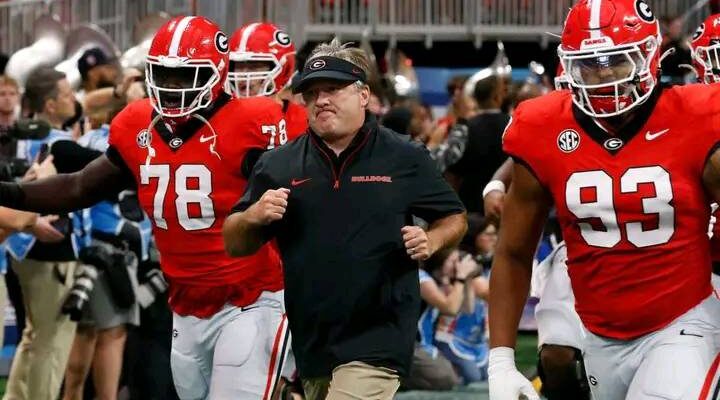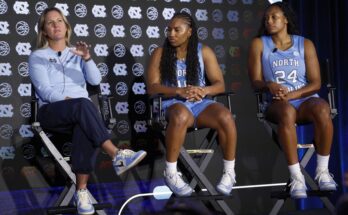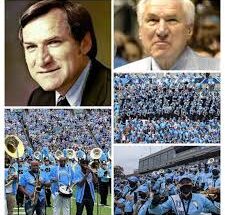Georgia’s Revamped SEC Offensive Unit: Why Cohesiveness and Coaching Could Outperform Star Power
In the highly competitive landscape of the Southeastern Conference (SEC), teams often lean heavily on recruiting the most highly rated players, banking on star power to propel their offenses to elite status. However, the Georgia Bulldogs present a compelling case where the traditional metrics of success—such as recruiting star ratings—may not fully capture the team’s offensive potential. Despite having fewer marquee recruits and a lower overall star rating compared to some of their SEC rivals, Georgia’s revamped offensive unit could still thrive. The reasons lie in the team’s cohesiveness and the strength of its coaching staff, both of which can offset the deficit in raw talent.
This analysis explores how Georgia’s offensive prospects, often underestimated based on recruiting rankings alone, could flourish through teamwork, disciplined execution, and strategic coaching innovations.
Recruiting rankings have long served as a key indicator of college football success. Programs with the highest-rated classes generally have a talent advantage, which can translate to dominance on the field. The SEC, in particular, is a hotbed of elite talent, with top programs consistently securing five-star recruits and top-10 recruiting classes nationwide.
Offensive success in the SEC has often hinged on players with exceptional physical traits—elite quarterbacks, dynamic wide receivers, and physically dominant offensive linemen. Recruiting star power typically implies a higher ceiling, with individual players capable of making game-changing plays.
Yet, this paradigm is not absolute. Teams with lower-rated recruiting classes can and do succeed by emphasizing other factors, such as player development, coaching acumen, and unit cohesion. Georgia’s offense offers a perfect example of this principle in action.
Georgia’s offense has undergone significant changes recently, with personnel turnover and schematic adjustments reshaping the unit. The team’s recruiting classes have trailed some other SEC powerhouses in terms of star ratings, especially at skill positions. Yet, Georgia has maintained a solid baseline of talent, particularly on the offensive line, and a group of experienced players returning who have developed within the system.
This blend of experience and development, combined with new coaching strategies, points toward an offense that is less reliant on individual star talent and more dependent on collective execution.
- Experience and continuity: Despite losing some players, the Bulldogs have retained core pieces who have matured in the program and understand the offensive system.
- Balanced talent: While there may not be standout five-star skill players, the roster features players with strong fundamentals and versatility.
- Strong offensive line: Georgia has traditionally excelled in the trenches, and this unit provides a foundation for both the running and passing game.
- Depth: The unit has quality depth, allowing for rotational freshness and injury mitigation.
- Versatility: Players capable of lining up in multiple spots and executing diverse plays increase strategic options.
One of the most undervalued aspects of a successful offense is cohesiveness. Unlike in professional sports, where roster turnover can be high, college teams that retain and develop players over multiple seasons often build an intuitive understanding of one another’s tendencies and the system.
- Communication: A well-coordinated offensive line can pick up blitzes and adjust protections seamlessly. Receivers and quarterbacks develop timing and trust that enable precision route running and anticipation.
- Discipline: Cohesive units tend to have fewer mental errors, such as missed assignments or penalties, which can derail drives.
- Adaptability: Familiarity allows players to make in-play adjustments without hesitation, responding to defensive looks effectively.
- Chemistry: Strong relationships between players foster confidence and resilience, particularly in high-pressure situations.
Georgia’s revamped offense benefits from returning players who have spent years in the system, allowing them to operate as a finely tuned machine rather than a collection of individuals trying to fit together. The offensive line, in particular, has been a bedrock of this cohesion, often regarded as one of the SEC’s most reliable units.
Talent can win games, but coaching wins championships. Georgia’s coaching staff brings a wealth of experience and tactical know-how that elevates the offense beyond the raw abilities of its personnel.
- Scheme flexibility: The coaching staff tailors the playbook to maximize player strengths, shifting between pro-style sets, spread concepts, and power-run formations depending on the opponent.
- Player development: Coaches emphasize technical skills and football IQ, helping players refine their craft and understand their roles deeply.
- Game planning: Thorough preparation and attention to opponent tendencies enable the offense to exploit weaknesses and adjust mid-game.
- Situational awareness: The coaching staff’s ability to call plays that optimize success in critical situations (third down, red zone, clock management) is a crucial advantage.
The Bulldogs have demonstrated their ability to innovate offensively, integrating new elements such as tempo variation and creative play-calling while maintaining fundamental soundness. This balance between creativity and discipline is a hallmark of elite coaching.
While star ratings reflect athletic potential and physical measurables, they do not account for intangible factors that contribute to team success:
- Work ethic: Players with lower ratings can outperform higher-rated recruits by dedicating themselves to improvement.
- Football intelligence: Understanding schemes, reading defenses, and making quick decisions are critical for offensive success.
- Leadership: Veteran players often serve as mentors and on-field generals, providing stability and motivation.
- Fit within the system: A player’s skill set must align with the offensive philosophy; a perfect scheme fit can elevate performance.
- Team culture: Positive environments foster accountability and unity, translating to better on-field results.
Georgia’s coaching staff prioritizes these intangibles, recruiting and developing players who fit the team’s culture and system. This approach helps mitigate gaps in star power.
Georgia is not alone in leveraging these advantages over star power. Several SEC programs have shown how cohesion and coaching can overcome recruiting limitations.
- LSU’s 2019 Championship Team: While LSU had plenty of talent, their offensive explosion under Coach Joe Brady showcased how innovative coaching and quarterback-coach rapport could maximize offensive output.
- Auburn’s 2010 Team: Despite not having the highest-rated class, Auburn won a national title with Cam Newton, a transfer QB who fit the system perfectly and a strong supporting cast developed over time.
- Alabama’s Consistent Success: Even with elite recruiting, Alabama’s key to sustained success has been coach Nick Saban’s ability to develop players and execute complex schemes.
These examples reinforce that recruiting stars are just one ingredient in the recipe for offensive success.
While cohesiveness and coaching are strengths, Georgia’s offense must still navigate challenges:
- Physical limitations: Fewer elite athletes can put the team at a disadvantage in speed and strength matchups.
- Inexperience at skill positions: New starters must quickly acclimate to SEC speed and complexity.
- Injuries: Depth helps but cannot eliminate risk entirely.
Georgia’s approach to these risks includes:
- Strength and conditioning programs to maximize player athleticism.
- Comprehensive film study and repetition to accelerate learning curves.
- Strategic play-calling to minimize exposure to mismatches.
Veteran leadership often serves as the glue that holds a cohesive offense together. Georgia’s returning players are expected to step into this role, providing guidance for younger teammates and maintaining the unit’s focus.
This leadership ensures:
- Accountability: Players hold each other to high standards in practice and games.
- Resilience: The offense stays composed during adversity.
- Consistency: Leadership helps maintain performance levels over a grueling SEC schedule.
In a conference famed for its physical defenses and dynamic offenses, Georgia’s ability to field a cohesive, well-coached offensive unit may give them a competitive edge against teams reliant solely on individual star talent.
By controlling the line of scrimmage, minimizing mistakes, and executing a versatile game plan, Georgia can:
- Sustain drives and control the clock, keeping potent opposing offenses off the field.
- Exploit defensive weaknesses through smart play design.
- Adapt to multiple defensive looks with scheme flexibility
Georgia’s revamped SEC offensive unit challenges the conventional emphasis on star power and recruiting rankings. Though it may lack the headline-grabbing five-star athletes, the offense’s potential success hinges on its cohesiveness and the caliber of its coaching.
This unity—built on experience, communication, leadership, and tactical innovation—enables Georgia to compete at the highest level. It serves as a powerful reminder that football is fundamentally a team sport, where collective execution often triumphs over individual brilliance.
In the coming seasons, Georgia’s offense could exemplify how disciplined teamwork, strategic coaching, and a shared vision can elevate a unit beyond the sum of its parts. For those watching the SEC, this offense offers a fascinating study in how the intangibles can redefine success in one of college football’s toughest conferences.



